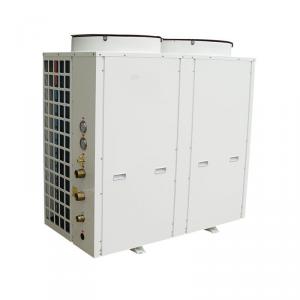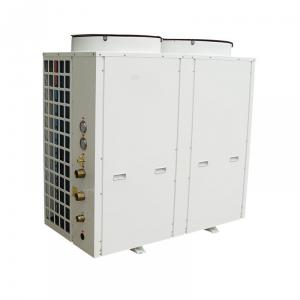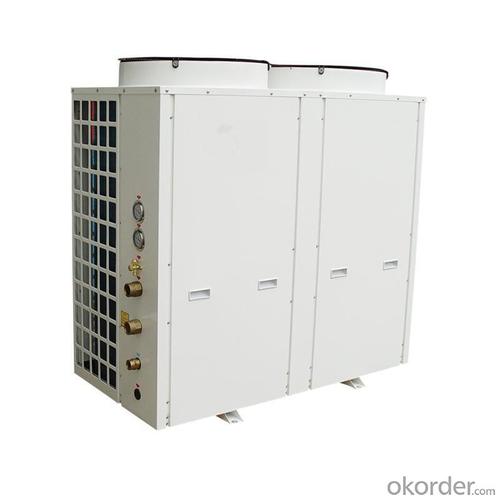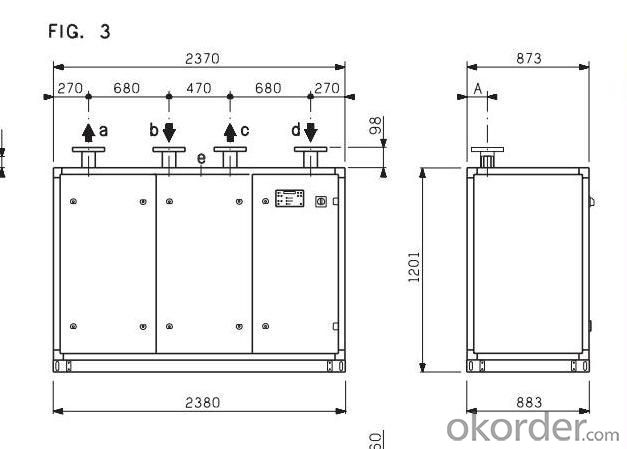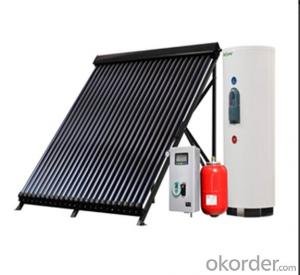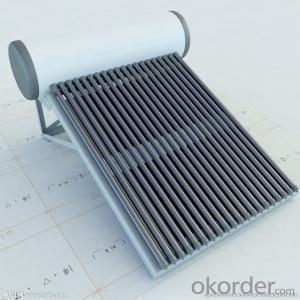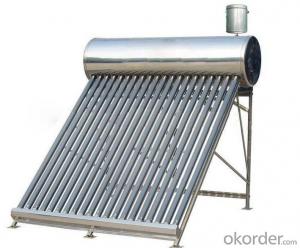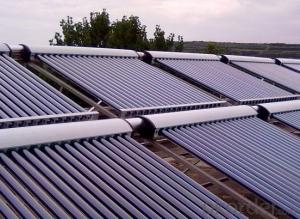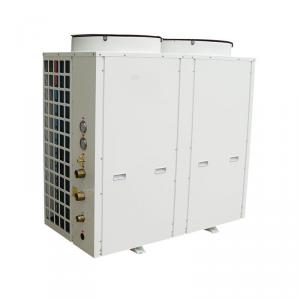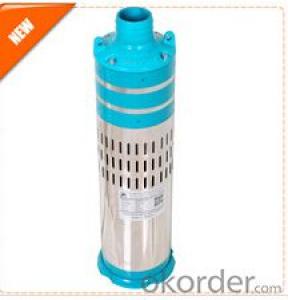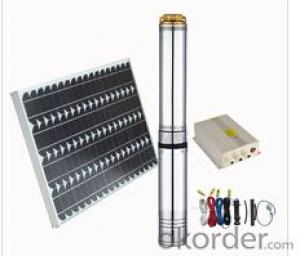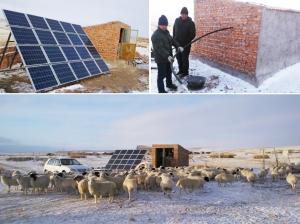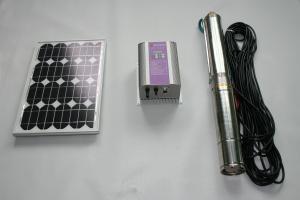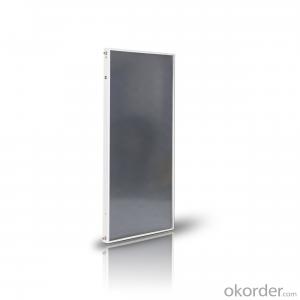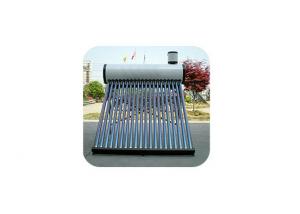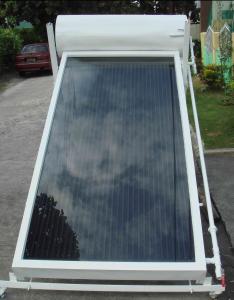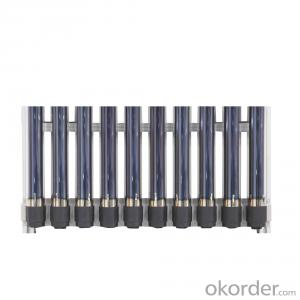Solar Water Heater for Cattle - Ground-Sourcing Heat Pump Earth Energy Systems
- Loading Port:
- China Main Port
- Payment Terms:
- TT or LC
- Min Order Qty:
- 1 Unit unit
- Supply Capability:
- 1000 Unit Per Year unit/month
OKorder Service Pledge
OKorder Financial Service
You Might Also Like
Specifications of Ground-sourcing Heat Pump
Ground sourced heat pumps simply move energy from one place to another. In the system, there is a refrigerant cycle, we call it reverse Carnot cycle, it consists of four component, Compressor, Condenser (doublepipe heat exchanger) ,Expansion valve, Evaporator (plate heat exchanger). The process of which is explained on the image below:
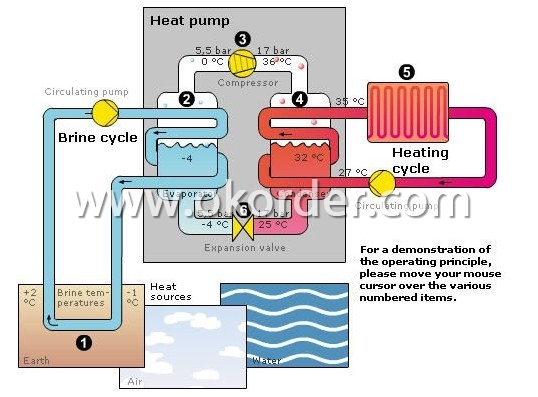
Technical Parameter of Ground-sourcing Heat Pump
| Items | Unit | 02WR | 03WR | 05WR |
| Heating Capacity | Kw | 7.2 | 11 | 19.8 |
| Cooling Capacity | Kw | 6 | 9.6 | 16.5 |
| Input Power | Kw | 1.7 | 2.6 | 4.35 |
| Running Current Heating | A | 9 | 13.6 | 8.8 |
| Dimension | L mm | 650 | 750 | 750 |
| W mm | 400 | 550 | 550 | |
| H mm | 750 | 850 | 850 | |
| Weight | Kg | 85 | 115 | 155 |
| Power Supply | V/PH/HZ | 220V/50HZ | 380V/3PH/50HZ | |
| COP | 3.9-4.8 | |||
| Condenser type | Stainless steel plate type heat exchange | |||
| Evaporator | Stainless steel ptype heat exchange | |||
Ground Loop Types of Ground Sourcing Heat Pump
Ground Source Heat Pumps can be categorized as closed or open loops. Those loops can be installed in three ways: Horizontally, vertically, or in a pond/lake.
Components Description of Ground Sourcing Heat Pump
We mainly use Copeland Scroll Compressor. It is high efficiency, low noise, stable and long life span. We use plate heat exchanger, the heat pump can work automatically.
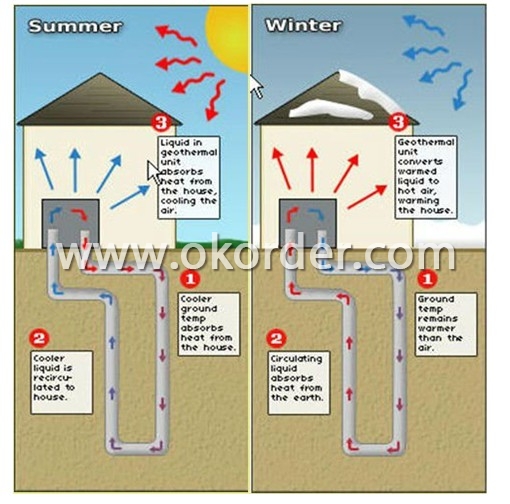
Usage and Applications of Ground Sourcing Heat Pump
Users can use it to supply sanitary hot water or/and heating house,house heating and house cooling.
Package and Delivery of Ground Sourcing Heat Pump
The whole system of Ground Sourcing Heat Pump is packaged in wooden box, delivered by sea. It should be avoid of moist, shaking and water to protect electricity product.
- Q: Can a solar water heater be used in areas with limited access to pellets?
- Yes, a solar water heater can be used in areas with limited access to pellets. Unlike pellet-based water heaters, solar water heaters rely on the energy from the sun to heat water. They typically consist of solar collectors, a storage tank, and a circulation system. The solar collectors absorb sunlight and convert it into heat, which is transferred to the water in the storage tank. This process requires no pellets or any other external fuel source. Therefore, as long as there is sufficient sunlight available, a solar water heater can be used effectively in areas with limited access to pellets or any other fuel source.
- Q: How does the reliability of a solar water heater compare to a traditional water heating system?
- The reliability of a solar water heater is generally comparable to that of a traditional water heating system. However, it depends on various factors such as the quality of the equipment, installation, and maintenance. Solar water heaters have fewer moving parts, which can reduce the chances of mechanical failures, but they are reliant on sunlight availability. In areas with consistent sunshine, solar water heaters can be highly reliable and cost-effective in the long run. Traditional water heating systems, on the other hand, are typically more consistent regardless of weather conditions but may require more regular maintenance and have a higher risk of mechanical issues. Ultimately, the reliability of both systems is contingent upon proper installation and regular upkeep.
- Q: Can a solar water heater be installed on a rooftop with limited sun exposure?
- A solar water heater can still be installed on a rooftop with limited sun exposure, but its efficiency and effectiveness may be compromised. The amount of hot water produced will be reduced compared to a rooftop with ample sun exposure. It is recommended to assess other possible locations with better sun exposure or consider alternative heating methods if sun exposure is severely limited.
- Q: Are there any safety concerns associated with solar water heaters?
- Yes, there are a few safety concerns associated with solar water heaters. One potential concern is the risk of scalding due to excessively hot water. Proper installation and maintenance, including the use of temperature controls and pressure relief valves, can help mitigate this risk. Additionally, there may be a need to periodically inspect and clean the system to prevent the buildup of sediment or corrosion, which could impact its efficiency and safety. Overall, while solar water heaters are generally safe, it is important to follow manufacturer guidelines and consult professionals for any safety-related concerns.
- Q: Can a solar water heater be used in areas with high levels of seismic activity?
- Yes, a solar water heater can be used in areas with high levels of seismic activity. However, it is important to ensure that the system is properly designed and installed to withstand the potential effects of earthquakes. Reinforcements and appropriate anchoring methods can be employed to secure the solar water heater and minimize the risk of damage during seismic events.
- Q: How does a solar water heater impact water conservation efforts?
- A solar water heater positively impacts water conservation efforts by reducing the need for traditional energy-intensive water heating methods. By harnessing the power of the sun, solar water heaters heat water without consuming additional resources, thus minimizing water wastage. This technology helps promote sustainable practices and reduces the overall water consumption in households or businesses, contributing to water conservation efforts.
- Q: How does the size of the storage tank affect the performance of a solar water heater?
- The size of the storage tank directly affects the performance of a solar water heater. A larger storage tank allows for more hot water to be stored, providing a greater supply of hot water for longer periods of time. This is especially beneficial during cloudy or low-sunlight periods when the solar collector may not generate enough heat to meet immediate demand. On the other hand, a smaller storage tank may lead to insufficient hot water supply, requiring additional heating methods or resulting in a reduced overall performance of the solar water heater.
- Q: Can a solar water heater be used in areas with limited hydrogen fuel cell resources?
- In regions where hydrogen fuel cell resources are scarce, a solar water heater can indeed be utilized. By harnessing sunlight, solar water heaters obviate the necessity for hydrogen fuel cells. These systems frequently incorporate solar panels or collectors that capture the sun's energy and transmit it to the water, offering a sustainable and renewable supply of hot water. Consequently, in locales where hydrogen fuel cell resources are limited or non-existent, solar water heaters remain a feasible and eco-friendly choice for water heating.
- Q: What are the common repair issues with a solar water heater?
- Some common repair issues with a solar water heater include leaks, faulty temperature sensors, malfunctioning pumps or valves, and buildup of mineral deposits in the system.
- Q: Are there any size limitations for solar water heaters?
- Yes, there are size limitations for solar water heaters. The size of a solar water heater is typically determined by the available roof space and the heating requirements of the household or building. Larger systems can generate more hot water, but they may require additional space for installation and have higher upfront costs.
1. Manufacturer Overview
| Location | Shanghai,China |
| Year Established | 1989 |
| Annual Output Value | US$2.5 Million - US$5 Million |
| Main Markets | " Asia;Western Europe;North Africa" |
| Company Certifications | We are a leading manufacturer of a broad range of ground-sourcing heat pump. Over the past few years, we has enjoyed unprecedented growth due in large part to the support of our valued customers. |
2. Manufacturer Certificates
| a) Certification Name | |
| Range | |
| Reference | |
| Validity Period |
3. Manufacturer Capability
| a) Trade Capacity | |
| Nearest Port | Shanghai |
| Export Percentage | 1% - 10% |
| No.of Employees in Trade Department | About 1000 |
| Language Spoken: | English;Chinese |
| b) Factory Information | |
| Factory Size: | |
| No. of Production Lines | |
| Contract Manufacturing | OEM Service Offered;Design Service Offered |
| Product Price Range | Average |
Send your message to us
Solar Water Heater for Cattle - Ground-Sourcing Heat Pump Earth Energy Systems
- Loading Port:
- China Main Port
- Payment Terms:
- TT or LC
- Min Order Qty:
- 1 Unit unit
- Supply Capability:
- 1000 Unit Per Year unit/month
OKorder Service Pledge
OKorder Financial Service
Similar products
Hot products
Hot Searches
Related keywords
